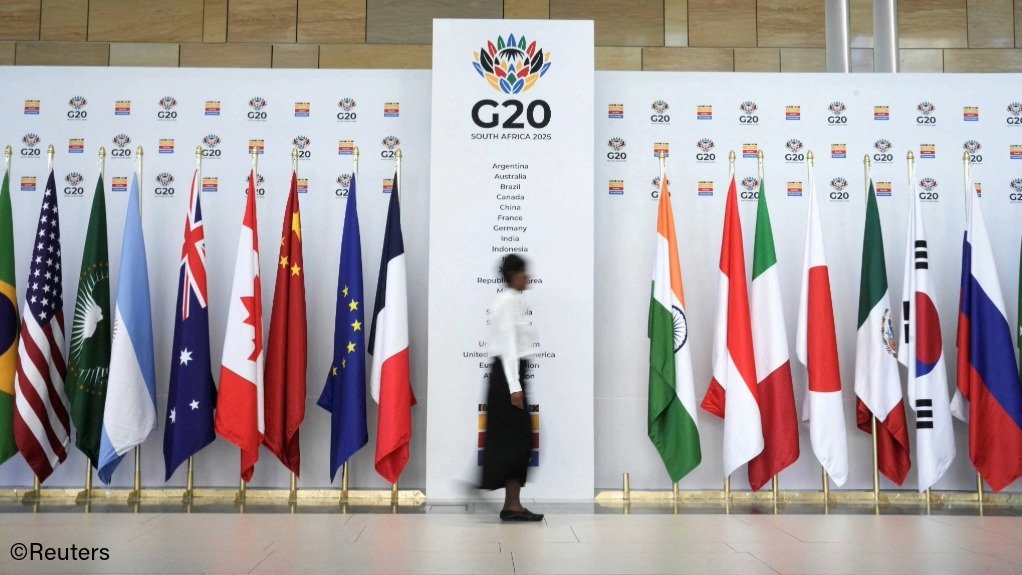An empty chair for Donald Trump at the G20 summit offers an opportunity for South African hosts, determined to set an agenda for global leaders in the face of the US president's hostility to multilateral diplomacy.
Washington says it won't attend the first G20 summit in Africa, because of allegations that the host country, previously ruled by its white minority under an explicitly racist apartheid system until 1994, now mistreats white people.
Trump has also rejected the host nation's agenda for the November 22-23 summit of promoting solidarity and helping developing nations adapt to worse weather disasters, transition to clean energy and cut their excessive debt costs.
While a summit without the world's most powerful country is not likely to culminate in an earthshaking declaration, the first G20 in Africa is a showcase for the continent, which has fast-growing economies, mineral wealth and a young population.
If anyone was hoping to simply ignore Trump's absence, they will have no chance. At the end of the summit, President Cyril Ramaphosa is meant to symbolically hand over the G20 to the next host. Who happens to be Trump.
"I don't want to hand over to an empty chair, but the empty chair will be there," Ramaphosa said last week, preparing for the summit at a venue in Soweto, the Johannesburg suburb where Black people were once confined under the apartheid rules that barred them from living in the city itself.
He would "symbolically hand over to that empty chair and then talk to President Trump," Ramaphosa said.
CHANCE TO FILL LEADERSHIP VACUUM
South Africa's planned agenda items include preparing for climate-induced disasters, sustainable debt for low-income nations, financing energy transitions, and ensuring the rush for critical minerals benefits producers.
Trump's ally, Argentine President Javier Milei, is also staying away on ideological grounds. Russia's Vladimir Putin will skip it because of the International Criminal Court arrest warrant against him over the invasion of Ukraine. China is sending Premier Li Qiang, instead of President Xi Jinping.
But Washington pulling out offers a chance for other countries, especially Europeans and China, to step up to fill the leadership vacuum, said Chris Vandome of the Chatham House think tank.
"Without the US playing its traditional role, such forums are even more important for cooperation," he said.
Piet Croucamp, associate professor of political studies and international relations at South Africa's North-West University, noted that Vice President JD Vance had caused a ruckus on his first trip to Europe with a hostile speech, and said a similarly disruptive US appearance at the G20 would have been "a distraction".
"Trump not coming to South Africa may be the best thing that could happen to the G20," he said.
It's a stage for individual national leaders to make a splash, especially those who see Africa as a priority.
Emmanuel Macron's Africa adviser, Jérémie Robert, said the French president planned to discuss energy transition, launch a Franco-South African business council and commemorate the role of some French citizens in the struggle against apartheid.
Two officials familiar with the matter said some countries saw an opportunity to shore up bilateral ties, and there was a possibility of trade deals and other partnerships on the side.
The hosts' desire to champion Africa, and the presence of an African Union delegation representing the continent as a whole, present opportunities to encourage fairness in exploiting minerals, which Africa has and everyone wants, said Busisipho Siyobi, public policy researcher at Good Governance Africa.
She noted that Africa has 600-million people lacking electricity who would benefit from an energy revolution, among the topics on the agenda.
'MULTILATERALISM IS DEAD'
Still, the summit is bound to frustrate leaders still committed to the old style of multilateral talks so deplored by Trump, who has slashed foreign aid, raised tariffs unilaterally and denounced global efforts to fight climate change.
Even before Trump's arrival in the White House, tensions between G20 members were making it hard for G20 summits to offer more than bland statements in recent years, as disagreements - especially over sharing the burden of climate action among some of the world's biggest polluters - prevented real commitments.
The United States had indicated it would veto mentions of climate change, two officials familiar with the matter said.
"South Africa wanted it to be about ... keeping multilateralism alive," said veteran South African journalist Steven Friedman.
"A very nice-sounding idea ... but it's running against the tide. At the moment multilateralism is dead."
EMAIL THIS ARTICLE SAVE THIS ARTICLE FEEDBACK
To subscribe email subscriptions@creamermedia.co.za or click here
To advertise email advertising@creamermedia.co.za or click here











